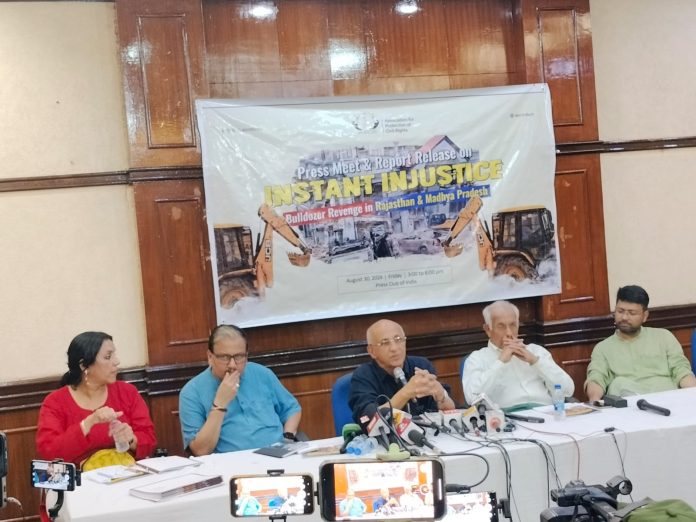New Delhi, Aug 31: The Association for Protection of Civil Rights (APCR) has unveiled two critical fact-finding reports highlighting the disturbing trends of state-sanctioned violence and extrajudicial actions in Udaipur, Rajasthan, and Chhatarpur, Madhya Pradesh. The reports, titled “State-Sanctioned Mobocracy: How State Machinery Fuels Communal Agendas and Extrajudicial Punishments” and “Bulldozing Dissent: Disproportionate State Crackdown on Muslim Protestors,” were released during a press conference at the Press Club of India here Friday.
The event was attended by prominent human rights advocates, former bureaucrats, legal experts, journalists, and concerned citizens. The panel featured Bhasha Singh, an independent journalist; Harsh Mander, former IAS officer; Manoj Jha, Rajya Sabha member; Wajahat Habibullah, former Chief Information Commissioner; M Huzaifa, advocate; Prakriti, feminist researcher; Muzammil Rizvi, social activist; and Javed Akhtar, community activist.
Nadeem Khan, who moderated the session, began by addressing the rampant and growing issue of bulldozer injustice across various Indian states, highlighting the impunity with which such actions are being carried out. Members of the fact-finding teams from Udaipur and Chhatarpur shared their experiences and findings, revealing a pattern of state machinery being misused for communal vendettas.
Advocate Muzammil Rizvi, Secretary of APCR Rajasthan, detailed how a minor altercation between two students in Udaipur escalated into a communal incident. He condemned the administration’s use of bulldozer injustice against the landlord of the minor accused, rather than addressing the situation with impartiality.
Adv. M Huzaifa of APCR questioned both legality and morality of the Udaipur administration’s actions. “This is not about a single demolition; it represents a state apparatus that has become a vehicle for communal vendetta and mob justice,” he said, adding that it appears as though the state machinery is being controlled by mobocracy.
Prakriti, a researcher with APCR, emphasized the need for restorative justice rather than retributive justice, particularly in cases involving communal violence. She stressed that the focus should be on reforming and healing society, rather than exacting revenge.
Syed Javed Akhtar, Secretary of APCR Madhya Pradesh, highlighted the deteriorating situation in Madhya Pradesh, where communal politics have taken a heavy toll. He recounted how, following two rallies on August 21 – one calling for an SC/ST Bharat Bandh and another by the Muslim community to file an FIR against a derogatory speech by a Hindu monk – the administration took a one-sided approach, targeting and arresting Muslim individuals, leading to an exodus of fearful Muslim families.
The second panel of the conference featured Harsh Mander, who traced the history of the bulldozer as a symbol of cruelty, now repurposed for injustice in India. Mander pointed out that the current government has weaponized the bulldozer to target a specific community, noting that no district in Madhya Pradesh has been spared from such state-sponsored actions. “The government itself is acting as a mob, targeting a particular community,” Mander stated.
Bhasha Singh criticized the role of media in glorifying bulldozer tactics, describing the media as a dangerous tool that celebrates such injustices. She warned that the government’s actions amount to running a bulldozer over history itself, urging the press to adopt a more critical stance against this trend.
Wajahat Habibullah drew parallels between the current situation and the events that led to Nazi Germany, warning that the state’s attempts to portray 20% of India’s population as non-belonging are alarming. He emphasized that this strategy is being used to paint Muslims as anti-national, all for electoral gain.
Finally, Rajya Sabha member Manoj K Jha urged the public to reflect on the consequences of the recent 2024 Lok Sabha election results, criticizing the judiciary’s selective approach. He lamented the lack of opposition when bulldozer tactics were first employed in Kashmir, noting that these actions have now become a campaign tool during elections.




